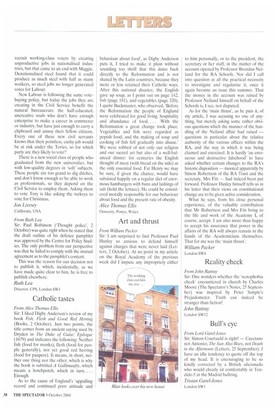Catholic tastes
From Alice Thomas Ellis Sir: I liked Digby Anderson's review of my book Fish, Flesh and Good Red Herring (Books, 2 October). Just two points, the title comes from an ancient saying used by Dryden in The Duke of Guise: Epilogue (1679) and indicates the following: Neither fish (food for monks), flesh (food for people generally), nor yet good red herring (food for paupers). It means, in short, neither one thing nor the other, which is why the book is subtitled A Gallimaufry, which means a hotchpotch, which in turn... . Enough.
As to the cause of England's 'appalling record and continued poor attitude and behaviour about food', as Digby Anderson puts it, I tried to make it plain without sounding too shrill that this dates back directly to the Reformation and is not shared by the Latin countries, because they more or less retained their Catholic ways. After this national disaster, the English gave up soup, as I point out on page 142, fish (page 181), and vegetables (page 320). I quote Buckmaster, who observed, 'Before the Reformation the people of England were celebrated for good living, hospitality and abundance of food. . . . With the Reformation a great change took place. Vegetables and fish were regarded as popish food; and the making of soup and cooking of fish fell gradually into disuse.' We were robbed of not only our religion and our sacred art but also of a well-balanced dinner: for centuries the English thought of meat (with bread on the side) as the only essential food. Fat Henry we may be sure, if given the chance, would have subsisted happily on a regular diet of enormous hamburgers with buns and lashings of salt (hold the lettuce). He could be considered morally responsible for our behaviour about food and the present rate of obesity.
Alice Thomas Ellis
Oswestry, Powys, Wales


















































































































 Previous page
Previous page